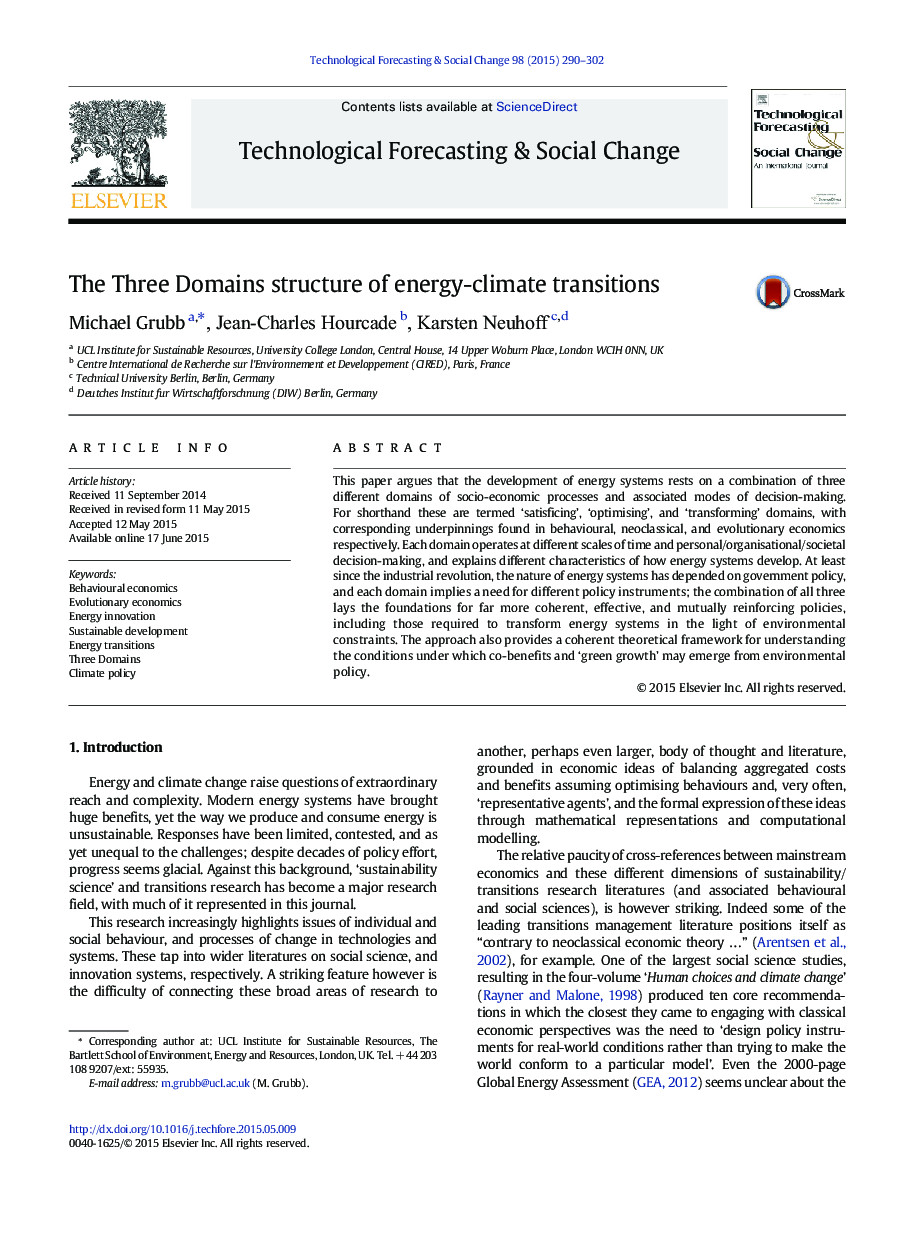| کد مقاله | کد نشریه | سال انتشار | مقاله انگلیسی | نسخه تمام متن |
|---|---|---|---|---|
| 7256601 | 1472402 | 2015 | 13 صفحه PDF | دانلود رایگان |
عنوان انگلیسی مقاله ISI
The Three Domains structure of energy-climate transitions
ترجمه فارسی عنوان
ساختار سه دامنه انتقال انرژی-محیطی
دانلود مقاله + سفارش ترجمه
دانلود مقاله ISI انگلیسی
رایگان برای ایرانیان
کلمات کلیدی
اقتصاد رفتاری، اقتصاد تکاملی، نوآوری انرژی، توسعه پایدار، انتقال انرژی، سه دامنه، سیاست آب و هوا،
ترجمه چکیده
در این مقاله استدلال می شود که توسعه سیستم های انرژی متشکل از سه حوزه فرایندهای اجتماعی-اقتصادی و روش های مرتبط با تصمیم گیری است. برای اختصار، این واژه ها به معنای "رضایتمندی"، "بهینه سازی" و "تبدیل" دامنه ها با مبنای متفاوتی در اقتصاد رفتاری، نئوکلاسیک و تکاملی می باشند. هر دامنه در مقیاس های مختلف زمان و تصمیم گیری شخصی / سازمانی / اجتماعی عمل می کند و ویژگی های مختلفی از نحوه توسعه سیستم های انرژی را توضیح می دهد. حداقل از زمان انقلاب صنعتی، ماهیت سیستم های انرژی به سیاست دولت بستگی دارد و هر حوزه نیاز به ابزارهای مختلف سیاست دارد؛ ترکیبی از هر سه پایه ای را برای سیاست های هماهنگ، موثر و متقابل تقویت می کند، از جمله مورد نیاز برای تبدیل سیستم های انرژی به سبب محدودیت های محیطی. این رویکرد همچنین یک چارچوب نظری منسجم برای درک شرایطی فراهم می کند که در آن مزایای مشترک و "رشد سبز" ممکن است از سیاست زیست محیطی ظاهر شود.
موضوعات مرتبط
علوم انسانی و اجتماعی
مدیریت، کسب و کار و حسابداری
کسب و کار و مدیریت بین المللی
چکیده انگلیسی
This paper argues that the development of energy systems rests on a combination of three different domains of socio-economic processes and associated modes of decision-making. For shorthand these are termed 'satisficing', 'optimising', and 'transforming' domains, with corresponding underpinnings found in behavioural, neoclassical, and evolutionary economics respectively. Each domain operates at different scales of time and personal/organisational/societal decision-making, and explains different characteristics of how energy systems develop. At least since the industrial revolution, the nature of energy systems has depended on government policy, and each domain implies a need for different policy instruments; the combination of all three lays the foundations for far more coherent, effective, and mutually reinforcing policies, including those required to transform energy systems in the light of environmental constraints. The approach also provides a coherent theoretical framework for understanding the conditions under which co-benefits and 'green growth' may emerge from environmental policy.
ناشر
Database: Elsevier - ScienceDirect (ساینس دایرکت)
Journal: Technological Forecasting and Social Change - Volume 98, September 2015, Pages 290-302
Journal: Technological Forecasting and Social Change - Volume 98, September 2015, Pages 290-302
نویسندگان
Michael Grubb, Jean-Charles Hourcade, Karsten Neuhoff,
